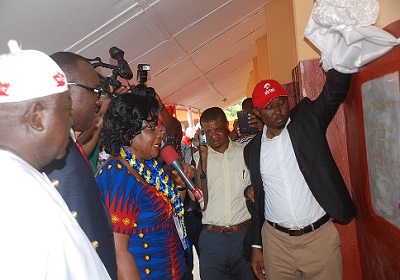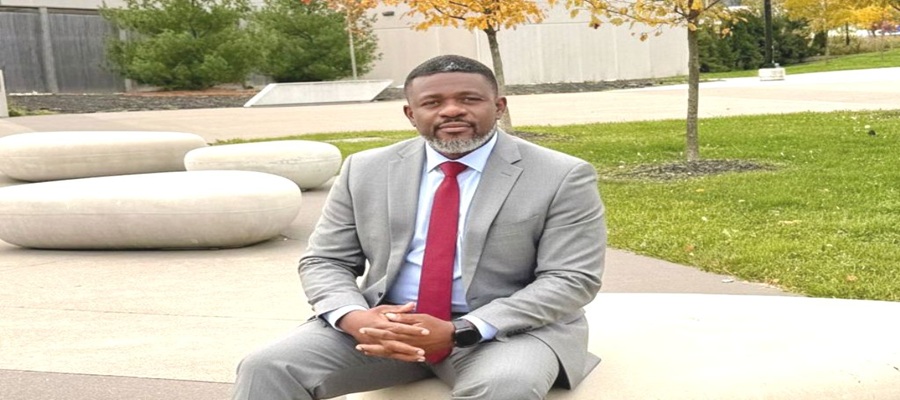Telecom
How Airtel’s CSR Initiative in 2013 Turned Cynosure

Upon being enrolled into the primary school, it didn’t take long before most pupils get accustomed to going to school every morning with at least a litre of water in their water bottles-tucked into their school bag along with writing materials.
It had become mandatory for the kids to take along some water to class every morning since the school lacked pipe-borne water from inception in 1934. Soon, it became a routine most parents and the pupils followed year-in year out.
Community Primary School located in Amumara, Mbaise under Ezinihitte Local Government, Imo State is one of the schools Amumara and other adjoining villages such as Oboama and Akpodun are privileged to have. For some children in these townships, going to school every morning mean walking for about 15 minutes to 25 minutes through thick shrubs along pathways carved by frequent treading by villagers.
Built on an expanse of bare land partly grassy and without a fence to define its compound, Community Primary School comprises three set of structures – one with classes for pupils and the adjacent block as offices for teaching staff. The third was built to serve as loo for the teachers and pupils.
Over the years, the facilities in the school had inevitably deteriorated, subjecting the teachers and pupils to hard conditions. Nearly all the classrooms were without windows or doors. Most of the desks and chairs in the classrooms had become wonky and fragile, having seen age.
Even the teachers had to manage their old tables and chairs. The walls cracked gradually, ceilings caved in, colours faded off the structures and many of the facilities became dilapidated.
Heat of the midday sun scorched both teachers and parents while classes went since there was no ceiling under the corrugated iron sheets above their heads.
Break time for the pupils meant fun and play after their meals. But the challenge they often faced was how to get sufficient water to quench their thirst after running freely in the wide playground. Most of them experienced dehydration since the water in their bottles hardly sufficed through the hours in school. To get a bucket of water for use in school required fetching from a well located in another compound which is about 10 minutes walk away.
Thousands of people, despite the deplorable situation in Community Primary School, have passed through the school and many more are still in the school learning.
There is no gainsaying to the fact that when enabling environment is provided for pupils to learn, they learn with the right frame of mind and are well developed. This means providing quality education to raise well-adjusted future leaders.
This is in line with the vision of the leading telecommunications service provider, Airtel Nigeria, as part of its vision to give quality education and opportunity to people in less privilege end areas in Nigeria. The Telco, therefore, had initiated a Corporate Social Responsibility programmed dubbed ‘Adopt-a-School.’
Under this programme, the telecom company in collaboration with some states government adopted schools in less privileged communities in an effort to support the state governments.
Schools adopted by Airtel are assisted by renovating their structures, providing them with notebooks, text books, uniform, desks and chairs, boreholes for potable water, appliances and other learning materials. In addition, the teachers are made more competent and developed through series of training courses.
Community Primary School in Amumara village, Mbaise, Imo State is one of the schools Airtel Nigeria has adopted in Nigeria. From the capital city of Owerri, getting to remote Amumara village takes about one hour drive through very few neatly tarred roads. The common means of transportation for most of the villagers are motorcycles and bicycles.
Commercial transportation is done by buses and taxis that convey people into far villages through clayey undulating roads and many village squares. Very few structures are made of clay while some houses are just like those found in urban cities.
Trees surround almost every house in the villages as pathways can easily be used to determine where villagers walk to and fro. Sign posts indicating some schools and churches dot the roadsides.
Today, a total number of 300 pupils and 16 teachers are in the school, but the situation has changed from an abysmal condition to an enviable state.
Teachers and pupils in the school are delighted to see the turnaround the school has undergone after Airtel Nigeria adopted it.
2 blocks of 10 classrooms were upgraded in the school, with furniture such as whiteboards, desks, tables, ceiling fans and fluorescent tubes. Hundreds of school uniforms, bags, notebooks, exercise books and penswere donated to the school. The offices of the teachers were also renovated, providing them with necessary furniture and appliances.
Pupils no longer have to laboriously weed the grassy compound as Airtel also provided a mowerfor the school.
The Telco in addition, provided a borehole which gives potable water to the teachers and pupils. So, this brings an end to the rigorous task of coming to school with filled water bottles. The pupils and teachers now have sufficient water for use.
Being a rural area not frequently visited by many cars, the Amumara village came alive on the 28th of November when the Community Primary school was commissioned by Airtel Nigeria amidst joy and excitement by teachers, pupils, parents, traditional leaders and members of the community.
Among those present were Mr. Segun Ogunsanya, managing director and chief executive officer, Airtel Nigeria, Dr. UcheEjiogu, cCommissioner of Education, Imo State, Sole Administrator, Ezinihitte Local Government, Dr. Kelechi Osuagwu; His Royal Highness, Eze Ositadinma Beneth Nwokocha; Chairman, Imo State Universal Basic Education Board, Mrs. Getrude Oduka; executives of Imo State National Union of Teachers (NUT); Dipo Jolaosho, Regional Marketing Manager, South, Airtel Nigeria; Chinda Manjor, CSR Manager, Airtel Nigeria and Erhumu Bayagbon, Media Relations Manager, Airtel Nigeria.
The Airtel boss who was represented by Godfrey Efeurhobo, regional operations director, South Region, said, Airtel was “extremely delighted to partner with the government and people of Imo State in our quest to chart a new course for the development of education sector in Nigeria in general and Imo State in particular.
“As we make progress towards achieving Education for All, attention is being given to those children who are still out of school, who are particularly hard to reach and who are at risk of being excluded, marginalized or otherwise disadvantaged in relation to education. Even when children attend school, they may not complete the full cycle of primary education and may not experience or achieve learning of good quality.
“There is no gainsaying the fact that quality education offers children the best opportunity in life to realise their dreams and become the leaders of tomorrow. It is also important to note that a good environment is crucial to the development of a sound mind.
“It is therefore, in recognition of the importance of education and as part of our corporate Social Responsibility and vision; that we have committed to the adoption of public primary schools across Nigeria called Adopt-a-School programme.
“Under the programme, we are adopting government-owned primary schools located in underserved rural and semi-urban, providing them with requisite infrastructure including classrooms, textbooks, furniture, school uniforms and school bags. Training the teachers is also part of the programme.
“Let me state categorically that for us this is a long-term commitment as we will remain part of this school well into the future providing the necessary support and care. As a matter of fact, some of our employees have volunteered to come in occasionally to support the teachers with teaching, mentoring and other academic and physical development programmes.
“Today, in Imo State, we commence the journey to start giving back to the people of Nigeria through sustained support for education at the most important level.
“I want to specially thank the Governor of Imo State, OwelleRochasOkorocha, for his visionary leadership and commitment to transforming the living conditions of the people of Imo State. The strides being made by the government in the area of education are second to none and we are proud to be associated with them.
“May I use this opportunity to congratulate the indefatigable Commissioner for Primary, Secondary, Adult and Non-formal education in the state Dr. Mrs. UcheEjiogu, who has been exhibiting high level of commitment in ensuring effective institutionalization of qualitative and comprehensive education in the state. Dr. Mrs. Uche Ejiogu`s unflinching support dates back to her days as Imo SUBEB Chairperson, during which the success we are witnessing today started.
“Also special thanks go to the Imo State Universal Basic Education Board which is championing the development of primary education in the state. The Board has been very wonderful in its support for our initiative. We also thank the authorities of Ezinihitte-Mbaise Local Government Council for its hospitality and support.
“Distinguished guests, ladies and gentlemen, permit me to appreciate your unalloyed support for this programme, both physical and moral, most importantly for your presence in spite of your busy schedule. Let me reiterate the point I made earlier that we are not just here to build a physical structure but we are here to stay in full support of this school and others which we are going to adopt in other parts of the country. The good people of this great Community and the pupils of Community Primary School, Amumara will remain ever green in our heart. This is our School. We will continue to look after the school and our children.”
In her address, the Commissioner of Education, Imo State, commended Airtel for its “high powered show of patriotism” which has brought development to the school. She said the government has therefore opened the doors to Airtel more than ever before “for more business relations geared towards expanding your reach to the benefit of Imo people.
“More so, like Oliver Twist, we are asking that you extend your ‘Adopt-a-School’ project to other schools in the remote villages and communities in Imo State.’ She said.
Commenting on the Adopt-a-School initiative of the telecom operator, Mrs. Felly Wulotu, head teacher of Community Primary School, said the teachers and pupils are very happy to see the impact of Airtel on the school. She praised Airtel for transforming the school and providing the pupils with needed learning materials, borehole and furnished classrooms.
“Parents now feel happy to bring their children to this school because of the development they see here. There are good classrooms, text books, note books, uniforms, school bags and borehole for clean water. We appreciate Airtel for this generous contribution to our school,’ she said.
Some members of Amumara community who also attended the commissioning praised Airtel for transforming the school to an enviable state, providing borehole for clean water, good classrooms with furniture, text books, uniform, school bags and other educational materials to pupils of the school.
Mr. Patrick Chukwuma, an elder in the community, noted that conditions in Community Primary School which was founded in 1934 had worsen over time, but “ we thank God today that immediately Airtel adopted it things have changed for the better.”
Another parent pointed out the School has suddenly become one of the schools that parents now want to enroll their children due to the development going on. “There are now good classrooms, available text books, note books, uniforms and clean water. All of these attract pupils to the school.”
As part of its Adopt-a-School programme, Airtel has renovated and commissioned schools in Lagos, Ogun and Cross Rivers states and also donated educational materials and other facilities such as borehole and generating sets.
At the handing over of borehole and donation of educational materials to St. John’s Primary School, Oke-Agbo, Ijebu-Igbo, Ogun State, on 21st of November, the Commissioner of Education, Ogun State, Barr. John OlusegunOdubela, said the gesture by Airtel made an indelible impression on the school, pupils and the community.
He said, “The Ogun State Government cannot but continue to appreciate Airtel for the adoption of one of the schools in the state under her CSR initiatives. This shows the degree of love Airtel has for Ogun State. This complimentary effort of Airtel in the field of education will indeed go a long way to assist in the delivery of a qualitative education in this community.”
The commissioner commended Airtel in bringing public and primary school, especially those in remote locations at par with the best run private schools in terms of infrastructure and academic performance, for the benefit of the less privileged children.
Odubela had said, “I sincerely appreciate the management of Airtel for deeming it fit to provide a borehole for the school and also presenting book, writing materials and uniforms to the pupils of St John’s Anglican Primary School, OkeAgbo, Ijebi- Igbo under its CSR programme.”
He also implored the pupils to justify the huge financial investment by making the best use of the opportunity afforded them through this unique gesture and by aspiring to greater academic excellence and good behaviour.
He also implored all stakeholders to team up in ensuring that the school is taken to higher pedestal thus becoming a pride to the community and the state.
Airtel’s Adopt-a-School programme is a robust initiative that offers underprivileged children access to quality education in a conducive environment.
It also provides them with all the materials for learning and study. As part of the programme, Airtel organizes trainings for teachers of its adopted schools to ensure that a high teaching quality is always maintained.
Other schools adopted under the Airtel’s CSR-driven initiative include Oremeji Primary School, Ajegunle, Lagos; St. John’s Primary School, Ijebu-Igbo, Ogun State and Presbyterian Primary School, Ediba, Cross River State. All the schools equally received materials such as school uniforms, furniture, text books, school bags etc.
Indeed, the support Airtel Nigeria is rendering to state governments by collaborating with them to provide adequate facilities for schools in less privileged areas has contributed significantly to the development of education in Nigeria.
Some of the Airtel adopted schools were hitherto considered by parents as unworthy to enroll their kids, but now they have become schools parents yearn to put their wards in due to the huge support Airtel is giving to its adopted schools.
Apart from turning the despair of these children to bright hopes and giving them encouragement to study hard, parents are also relived of the cost of some learning materials.
Telecom
Nnaemeka Ani – The Architect of ‘Code and Courage’

In the rapidly evolving landscape of African technology, few figures bridge the gap between high-level research and grassroots digital execution as effectively as Nnaemeka Ani.

Nnaemeka Ani
As the Founder of MGX Research Center and the visionary behind MexyGabriel, Ani has emerged as a leading protagonist in the narrative of Nigeria’s technological self-reliance.
The Visionary: Founding MGX Research
At the heart of Ani’s philosophy is MGX Research, a center dedicated to “first-principles thinking.” Under his leadership, the center has become a beacon for data-driven innovation, moving beyond the “hype” of the tech world to focus on persistent, localized solutions.
Through MGX Research Center, he is building a multidisciplinary ecosystem that cuts across artificial intelligence, data science, cybersecurity, smart cities, digital identity, e-governance, EdTech, HealthTech, robotics, and automation
Ani’s mantra – “Africa’s rise begins with its own innovation” – is not just a slogan; it is a call to arms for African builders to stop seeking international validation and start authoring their own digital destiny.
As Founder and CEO of MexyGabriel Tech Company, Nnaemeka has driven multiple large-scale technology projects across Nigeria, focusing on digital infrastructure, enterprise solutions, identity and payment platforms, and youth-centered innovation programs. MGX Research Center functions as the research and development arm of this broader ecosystem, providing the thinking laboratory, prototypes, and strategic insights that inform products, policies, and investment decisions.
Nnaemeka is passionate about youth empowerment, innovation, and Africa’s digital future. His work through MGX Research Center aims to position Nigeria not just as a consumer of technology but as a creator of solutions, producing world-class research, thought leadership, and practical tools that can be deployed across states, universities, and private organizations.
He frequently collaborates with universities, government ministries, tech hubs, and global partners, championing a model where research is not locked up in theory but translated into deployable systems, smart policies, and scalable ventures.
Ani has demonstrated a unique ability to turn complex code into commercial and social value. His work has focused on:
- Infrastructure for Good: Developing platforms that bridge the divide between urban tech hubs and rural communities.
- Sovereign Technology: Championing the idea that African data should be managed by African-built systems.
The Public Servant: Digitizing Enugu State
Ani’s influence extends into the corridors of power. Serving as the Special Adviser to the Enugu State Governor on ICT, he has been instrumental in transforming the state into a burgeoning digital ecosystem.
His work in Enugu serves as a blueprint for “Governance-Tech Synergy,” proving that when political will meets technical expertise, public service delivery can be revolutionized.
“We are no longer just ’emerging’; we are competing. Africa will rise by code, by courage, and by us,” said Nnaemeka Ani.
Quick Facts: Nnaemeka Ani
Category | Detail |
Current Roles | Founder, MGX Research; Founder, MexyGabriel; SA on ICT to Enugu State Governor. |
Core Philosophy | “First-Principles Thinking” – Breaking problems down to their core truths. |
Key Advocacy | Digital Sovereignty, Sovereign AI, and localized STEM education. |
Notable Mantra | “By Code and By Courage.” |
Why He Matters in 2026
As Nigeria enters a transformative year marked by the January 1, 2026 Tax Reforms and the push toward 70% Broadband Penetration, Ani represents the “New Guard” of leadership. He is one of the few voices consistently advocating for the Tripod Method, balancing technology, local policing, and traditional authority, to ensure that Nigeria’s digital growth is matched by national security.
Nnaemeka Ani is not just as a “tech guy,” but as a Strategic Reformer. He is a “Leader to Watch” because he understands that for technology to thrive in Nigeria, it must be supported by sound policy and cultural relevance.
Telecom
MTN Nigeria Appreciates Partners, Customers at Lagos Prestige Experience

MTN Nigeria has hosted the Prestige Experience, a refined evening of culture, connection and celebration, as part of its ongoing Y’ellotide initiative marking the Yuletide season.

MTN Nigeria
The event, held on Friday at The Royal Box, Victoria Island, Lagos, brought together customers, partners, stakeholders, and dignitaries in an atmosphere of appreciation and festivity.
The Prestige Experience showcased Nigerian creativity and elegance through a curated blend of fine dining, fashion, and music. Guests were treated to Michelin-inspired cuisine prepared by renowned Chef Stone, fashion showcases highlighting African heritage, and soulful performances by acclaimed singer Asa.
The evening was anchored by popular hosts Ebuka Obi-Uchendu and Michelle Dede, with comedic interludes from veteran comedian Alibaba.
Speaking at the event, Dr Ernest Ndukwe (OFR), Chairman of MTN Nigeria, described the gathering as an expression of gratitude and partnership. He said the Prestige Experience reflected MTN’s appreciation for the trust Nigerians continue to place in the brand.
“The MTN Prestige Experience is a cornerstone of our commitment to you, our valued partners. Your trust and continued patronage are the bedrock of our success, and this gathering reflects our appreciation for that trust.
“We are not just a service provider but are committed to being a trusted partner in Nigeria’s progress,” Ndukwe said.
In his remarks, Dr Karl Toriola, Chief Executive Officer of MTN Nigeria, emphasised the importance of genuine connection during the festive season.
“We recognise the immense value of the relationships we have built together, and we are committed to ensuring that your experience remains unparalleled.
“You are essential partners in our journey, and we look forward to many more years of shared success and collaboration,” Toriola said.
Distinguished guests at the event included members of MTN’s Board and Executive Management, industry leaders, government officials, members of the diplomatic community, and representatives from the creative sector, reflecting the diversity and richness of the MTN ecosystem.
The Prestige Experience forms part of MTN’s broader Y’ellotide celebrations, which reaffirm the company’s belief that meaningful connections and shared experiences remain central to its relationship with Nigerians.
Telecom
Google Finally Allows Users to Change Gmail Address, Keeps Data and Services Intact

Google has unveiled a new feature that allows Gmail users to change their existing email addresses without losing data or access to services, marking a major shift in the company’s long-standing policy.

Gmail
According to an update on Google’s account help page, the new option enables account holders to replace their current @gmail.com address with a new one while retaining all associated data, including emails, photos, and integrations with services such as Google Drive, Maps, and YouTube.
The guidance, however, was first spotted on the Hindi version of Google’s support page, suggesting that the rollout may begin in India or Hindi-speaking markets before expanding globally.
The English-language support page still carries the older advisory that Gmail addresses “usually cannot be changed.”
Google explained that under the new policy, users who update their Gmail address will automatically keep their original address as an alias.
This means emails sent to the old address will continue to arrive in the inbox, and the original address will remain valid for signing in to Google services.
Previously, users seeking a new Gmail address had to create an entirely new account and manually transfer their data, a process that often disrupted third-party app integrations. The new feature eliminates that inconvenience, ensuring continuity for users.
The company further clarified that while users can reuse their old Gmail address at any time, accounts that change their address will face certain restrictions.
These include a 12-month waiting period before another new Gmail address can be created, and the inability to delete the newly chosen address once it has been set.
Google assured users that all existing data would remain intact after an address update, including stored photos, messages, and emails.
The gradual rollout of the feature indicates that full global adoption is expected in the coming months, a move likely to be welcomed by millions of users who have long requested the ability to update their Gmail identities without starting afresh.

 Telecom2 days ago
Telecom2 days agoGoogle Finally Allows Users to Change Gmail Address, Keeps Data and Services Intact

 General News2 days ago
General News2 days agoT2 Backs Youth Excellence as NCBC Wins Bosun Tijani Foundation Basketball Tournament

 News2 days ago
News2 days agoInsomniaQ Spotlights African Creativity in Lagos

 E-Financial19 hours ago
E-Financial19 hours agoNigeria’s N58.18trn Budget and Rising Cost of Deficit Governance

 Telecom19 hours ago
Telecom19 hours agoNnaemeka Ani – The Architect of ‘Code and Courage’

 Telecom19 hours ago
Telecom19 hours agoMTN Nigeria Appreciates Partners, Customers at Lagos Prestige Experience






















